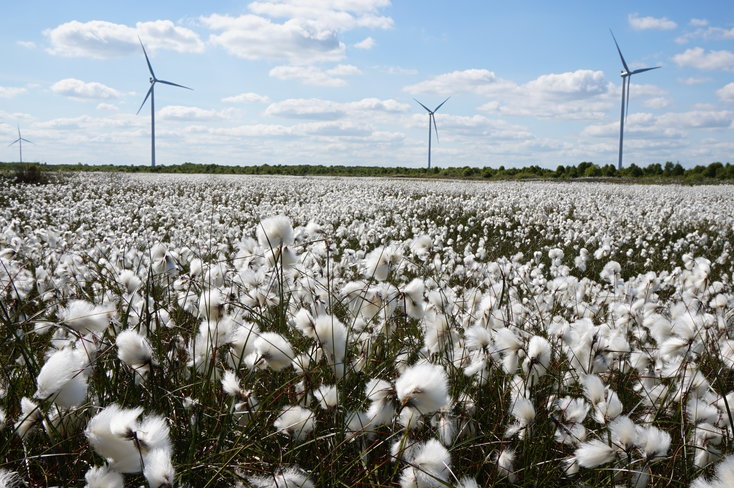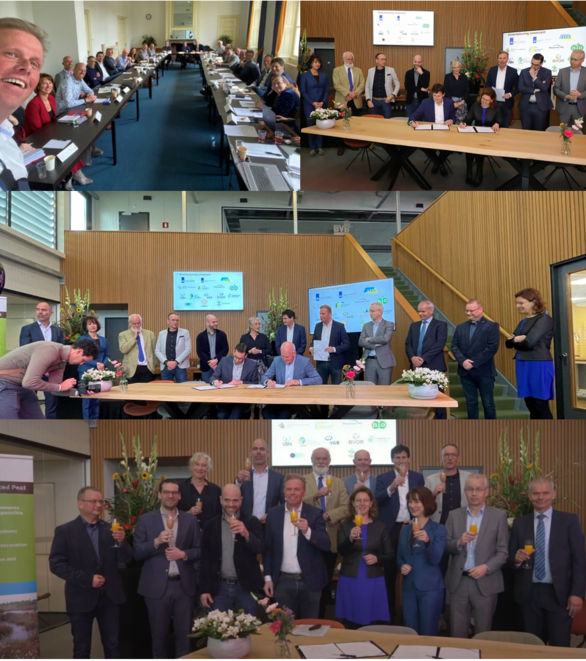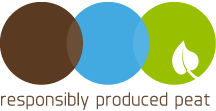
Responsibly Produced Peat certification ensures that peatland will be used, managed and restored in a responsible way
Protection of areas with High Conservation Value
The RPP certification system does not allow peat extraction from areas with High Conservation Value. It encourages peat extraction from highly degraded areas followed up by appropriate after-use measures.
High Conservation Values (HCV) are biological, ecological, social or cultural values of outstanding significance or critical importance. This can, for example, be the presence of rare species or special ecosystem services. RPP certification prevents that peat extraction affect these HCVs. In addition, rehabilitation measures can result in a net gain in natural values. Especially after extracting peat from degraded peatland used for agriculture or forestry. This way RPP generates benefits for both, nature and industry.
Preference for restoration or other wet after-use
Responsibly Produced Peat certification secures the best possible development after completion of peat production.
Traditions for peatland use and ecological conditions vary between countries. National legislation, land owners, and environmental policy guidelines set the outlines for possible after-use regimes in many countries. For RPP, the after-use destination should be an improvement of the area compared with the degraded start condition. RPP prefers restoration or other wet after-use. In any case, it has to be the best possible destination with maximum environmental benefits, including climate change mitigation. Sphagnum-farming can for example be a responsible choice for wet after-use, the area will stay wet but can be productive at the same time. Harvested Sphagnum can be used in the production of substrates.
Stakeholder consultation, including local authorities, environmental NGOs and local communities, is an important part of the procedure for selecting the best possible after-use destination.
Assuring the availability of peat from responsible sources
Peat is currently the most important and valuable constituent for growing media. Peat secures the stability of the substrate which is very important for horticultural use. Other materials are also used, often in addition to peat.
So peat as a solid base allows the application of other raw materials. Nowadays (organic) residues from various sources are offered as potential raw material for growing media. Often these products -as such- are not suitable as raw material for growing media. The products don’t meet the basic requirements regarding e.g. phyto-hygienic and nutritional aspects. They can however replace a part of the peat content in growing media.
RPP is not about the best quality or what the composition of substrate should be. RPP is about responsible production, and believes that wherever peat is to be used, it should be RPP certified.
Responsibly Produced Peat animation
About our foundation
Mission
To develop and administrate a certification scheme for the responsible and transparent production of peat resources.
To stimulate and facilitate the certification of companies based on a certification scheme. RPP certification ensures that responsible peat production is recognizable for the market and the society.
Vision
Responsibly Produced Peat aims for broad support in Europe and mainstream application.
The Principles and Criteria of Responsibly Produced Peat are both practical and credible, and the certification system is established in consultation with various stakeholders and organizations. Mainstream application will result in responsible managing of peatlands to reach a healthy balance between conservation and utilization of peatlands.

Why do we need peat?
Advantages of peat
Peat soil is particularly suitable for horticulture and facilitates the use of other raw materials. We need growing media to produce vegetables, flowers and plants.
Free of pathogens
The most important feature is that peat has many beneficial organisms but almost no plant pathogens or weed seed . It comes from natural areas with little risk of contamination with harmful organisms.
Optimal water retention and aeration
For centuries peat was formed from plant remains in marshy wetlands. The result is a fibrous material that holds water well and ensures good aeration. Their root structure provide perfect conditions for young plants to shoot.
Low pH value and nutrient content
Peat is acidic by nature and low in nutrients which means that by adding a desired amount of lime and nutrients almost all plant specific requirements can be realized.
The situation
Peatland for horticulture
Growing media are an important basis for both professional production of vegetables and ornamental plants, and the consumer market.
The use of peatlands for horticultural peat production represents a small fraction of the use of peatlands in Europe. No more than 0,4% of the peatlands in Europe is used for peat extraction. About 40% of the European peatland is used for agriculture and forestry. These peatlands are drained, otherwise they can’t be used.
Availability
When peatlands are drained and degraded they emit CO2 (carbon dioxide). This is a so called “greenhouse gas” and the emission has an impact on climate change.
These degraded peatlands can be used for peat production. In the long term, after extraction has finished, their rehabilitation shall always aim for maximum improvement of environmental conditions and reduction of CO2 -emissions.
About 58 % of the peatlands in the EU are degraded.
Protected natural peatlands
About 18% of the acreage in the European Union, has the Natura 2000 conservation status. A prominent part concerns peatlands and other wetlands.
RPP certification does not allow impact on conservation areas. It also implies leaving all ecological valuable areas, with or without a nature conservation status, undisturbed.

The Dutch Covenant
on the Environmental Impact of Potting Soil and Substrates
The aim of this covenant is to reduce the environmental impact of substrates in the chain. To achieve this reduction, efforts by the parties will include encouraging concerned entrepreneurs to:
(a) make more use of renewable raw materials and
(b) use only certified peat.
For 2025, the aim is for substrates containing peat raw materials to carry the RPP label (or equivalent) 100% of the time.
Besides the environmental impact, this also concerns nature restoration and the biodiversity of peatlands.
The covenant was signed on November 18, 2022 by 15 parties from the business community, The Minister of Agriculture, Nature and Food Quality and the Minister for Climate and Energy Policy on behalf of the State of the Netherlands, knowledge organizations and NGOs.
English translation Covenant (see article 6, page 7 for the role of RPP).
Press release on the website of the VPN, the Dutch Association of Potting Soil and Substrate Producers (in Dutch).
